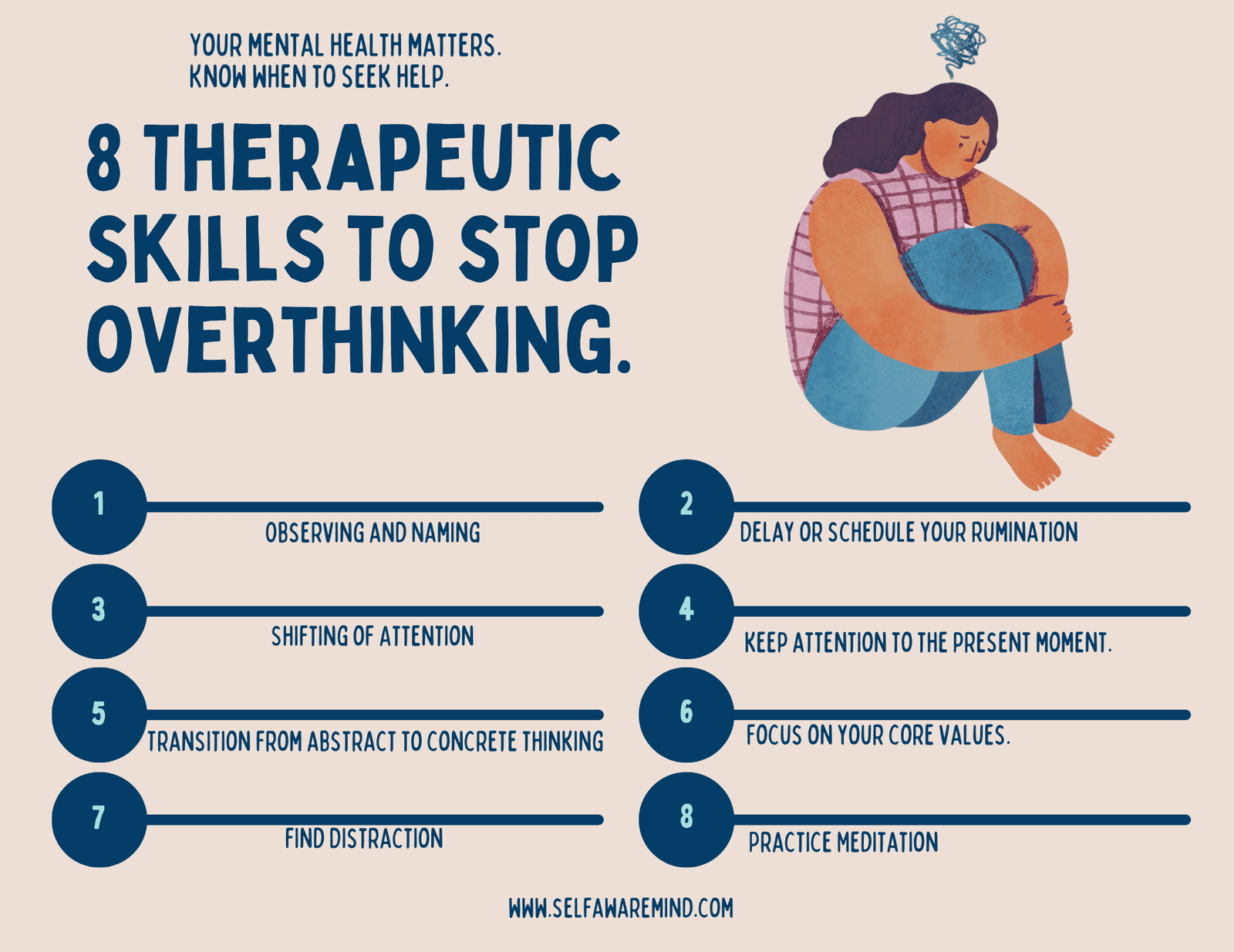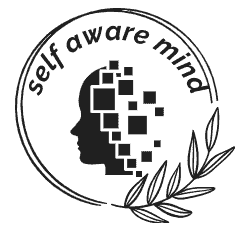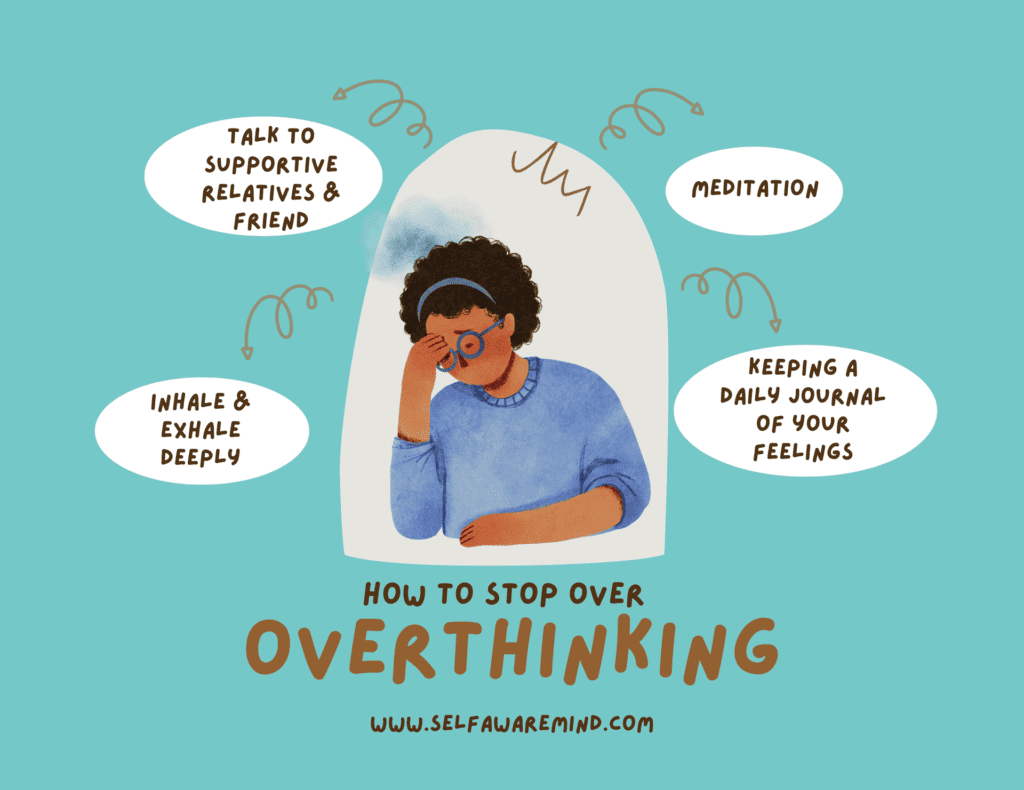Everyone experiences overthinking at some point in their life. However, some people struggle to stop the constant stream of unwanted negative thoughts.
It is common to ruminate, which is essentially rehashing the past. For instance, thinking, “I shouldn’t have made that comment in last week’s meeting” or “I regret leaving my previous job; if I had stayed, I would probably be happier than I am now.” Similarly, you may have thoughts like, “I shouldn’t have eaten that piece of cake at the party yesterday. I am going to be fat forever.”
“These patterns of thought are closely linked with feelings of regret and guilt.”
In this article, we talked about therapeutic skills to stop overthinking and negative thoughts and start living your life.
When we hold on too tightly to our thoughts, whether we accept them or fight against them, they tend to become more prominent. The way our brain functions is that it gives more attention to the things we focus on. Essentially, our brain is wired to pay more attention to the things we think about frequently.
According to Smith and Alloy (2009), rumination or overthinking is caused by feelings of loss, threat, or injustice. According to Morrow and Nolen-Hoeksema (1990), the prominent aspect of rumination is negative self-reflection. Additionally, it is characterized by a repetitive and persistent pattern of focusing on negative emotions (Nolen-Hoeksema, 2000).
Table of Contents
ToggleWhat are negative thoughts?
A state in which you constantly predict negative and catastrophic future outcomes. For example, if I submit my report to my boss, I may assume that she will reject it, which could result in my dismissal from the job. As a result, I may be unable to pay my mortgage, causing me to lose my home and ultimately fail to provide for my family.
Constantly worrying about potential disasters causes fear and anxiety, leaving you in anguish.
It’s understandable to feel overwhelmed by the possibility of disasters and the impact they can have on our lives. However, constantly focusing on these potential threats can cause a great deal of fear and anxiety, which can be tough to deal with on a day-to-day basis. It’s important to find ways to manage these feelings and take steps to feel more secure and in control. Let’s explore some options together!
Gwendoline Smith in her book The Book of Overthinking: How to Stop the Cycle of Worry.
“I believe that the more knowledge you have about what you are experiencing, the closer you are to managing those unwanted thoughts and experiences.”
(Smith, 2021)
If you are an overthinker, you are well aware of this cycle. It is easy to believe that you have no control over it or that you cannot break the cycle of overthinking and worrying. But you can learn the skills to stop overthinking.
There are at least four types of overthinking:
- Rumination about the past.
- Worry about the future.
- Overanalyzing decision.
- Social Anxiety.
8 Therapeutic skills to stop Overthinking and Negative Thoughts

Observing and Naming
Ruminating or overthinking is often an unconscious habit that we’re not aware that we’re doing. The first step is to identify it. When you find yourself overthinking, say out loud, “I am overthinking.” You can also request that someone point it out to you.
Learning your triggers is another way to become aware of your overthinking. What kinds of situations make you anxious and cause you to overthink, and what time of day do you overthink the most? Or where are you most likely to overthink? Is it when you are alone? Is it at home or at work?
Try predicting it; that is all. So, if you are prone to overthinking something right before going to bed or right after a social situation, prepare to be aware of it. By doing so, you can shift your focus to more productive thoughts or something that would benefit you. Try to keep track of it for a week to see how much you have been overthinking. This will help you identify and address the issue effectively.
Now that you are good at recognizing when you are overthinking, we will take two approaches.
- Setting limits on overthinking
- Learning ways to redirect negative thoughts.
Delay or schedule your overthinking
Delaying or arranging a specific time to deeply think about something could be helpful.
If you catch yourself ruminating or overthinking, tell yourself, “I will deal with this later” or “I will worry about it at 2 p.m.” This simple statement tells your brain that you will address the issue later, which can help you stop worrying and nagging. You will be surprised at how much power you have over your worries and thoughts.
If you’re starting to notice that you worry a lot and you’re trying to find a way to manage it, a great practice is to schedule a specific time for worrying every day for a month. This will help your brain understand that you’re taking your worries seriously. You can set a time limit for how long you’ll worry or try to solve a problem during the scheduled time. For example, you can say, “Every day at 2 p.m., I’ll spend 35 minutes worrying, and then I’ll go back to doing what’s important to me.” This way, you’ll be able to manage your worries and prevent them from interfering with your daily life.
I would like to emphasize something very important for you to remember.
“Never, ever worry in your head.”
“Do it on paper.”
“Write down what is bothering you.”
The Shifting of Attention
Your brain is like a machine that constantly generates thoughts. However, you do not have to believe every thought that comes to your mind. Just because a thought is persistent, frequent, or intense does not necessarily mean it is accurate or helpful. You are more than your thoughts; you are the referee. Therefore, you can learn to distinguish yourself from your thoughts and decide which ones you want to embrace and which ones you want to discard. This is a skill that can be learned and developed through mindfulness practice.
When you become good at noticing your thoughts, it can also help to visualize shifting them as changing the channel. Imagine that you have a remote control for your thoughts, and you can click the channel button to shift your focus to what you want to be attentive to. You might shift your attention from a compulsive thought to something you’re grateful for, or from thinking about things you can’t control to what you can control. You might also change your perspective from seeing everything as horrifying to finding a more constructive way of thinking about the situation.
Changing the channel means directing your attention to specific things that are within your control and are action-oriented, which are more beneficial uses of your energy than simply sitting there and spinning your mental wheels.
After successfully learning to catch yourself when you start to overthink and avoid getting too caught up in those thoughts, it is time to focus on ways to shift your thinking to something more helpful and practical. Practice implementing these techniques to improve your thought patterns and mindset.
Shift your attention from negative thoughts to the present moment.
When you try to stop overthinking or fail to choose where to direct your focus, you risk falling back into the habit of overthinking. This is because nature always seeks to fill a void. Therefore, it is important to start with the antidote that is always available to us.
“It’s the present moment.”
“The present moment is what matters.”
Negative thoughts can be difficult to let go of, but I encourage you to try to shift your focus to the present moment. Pay attention to the people you are with and the activities you are doing. It may help you feel more centered and grounded.
Let’s assume there is a window and some words written on it that capture your attention.
It’s easy to get caught up in the words on a window. However, if you shift your focus beyond that window, you’ll realize that there’s a beautiful world right in front of you. Even if we’re struggling with a particular thought, we can still find joy and beauty in our surroundings.
I understand that it is sometimes necessary to pause and check in with ourselves. Take a moment to observe your surroundings. What catches your eye? And how are you feeling physically and emotionally right now? Take a moment to use your senses. What do you see? How do you feel in your body?
“Can you notice yourself breathing?”
It’s possible to train ourselves to focus on the present moment instead of getting caught up in repetitive, ruminant thoughts. Although this skill can be difficult to acquire, especially when we’re feeling overwhelmed by a big problem, with practice, it becomes easier to shift our attention away from the cause of our stress. By learning to redirect our focus, we can reduce the impact of negative thoughts and emotions on our well-being.
Transition from abstract to concrete thinking
Abstract or vague thinking may come across as overgeneralization. This way of thinking frequently leads to questions such as, “Why can’t I do anything right?” or “Why can’t I be as happy as my friends?” This kind of thinking can lead to feelings of self-loathing and helplessness. Instead of focusing on these big, hazy issues, it is better to concentrate on one or two specific details and look for simple things you can do.
It is critical to ask the right questions in order to find a solution. However, asking “why” questions often leads to overthinking and rumination. Examples of these questions include “Why am I such a failure?” “Why are people so mean?” “Why am I depressed?” “Why do I overthink?” Unfortunately, none of these questions result in actionable steps toward improvement.
It’s common to ask ourselves, “Why me?” when dealing with despair. However, a better approach is to ask, “What is one small thing I can do today for my mental health?” Taking a walk outside or reading a book can be simple yet effective ways to improve our mental health. Similarly, instead of wondering why we can’t succeed in a relationship, we can ask, “What is one relationship skill I can work on?” Focusing on one thing at a time and working on it practically and consistently can lead to positive results.
Focus on your core values.
Focusing too much on overthinking won’t help stop it, and obsessing about it won’t help either. That is because attempting to make thoughts disappear usually backfires. Instead of simply distracting yourself, you must first identify what you want more of in your life before you can start to change your overthinking habits. By learning how to shift your focus to what really matters to you, you can retrain your brain to use its energy in a helpful way. That could include being more present with your children, learning to relax, taking positive steps, or living in a more meaningful way.
If you find yourself struggling with chronic overthinking, ask yourself this simple question: What is most important to you right now? That can help you clarify your priorities and focus your energy on what truly matters. Overthinking often leads to feelings of withdrawal and isolation, but it’s important to reverse this pattern and take small steps toward connection and engagement. One way to do this is by exploring your values and identifying what you want your life to be about. This can help you move forward with greater clarity and confidence by giving you a sense of purpose and direction.
Find Distraction
Distraction might seem like a solution to stop overthinking, but it can lead to avoidance and make the problem worse. When we avoid facing life, we also avoid the things that matter to us. Endlessly watching Netflix or mindlessly scrolling through Instagram might give us temporary relief, but it can strip away the meaning, purpose, and joy from our lives. So, it’s consequential to be mindful of how we use distractions and not let them take over our lives.
Breaking bad habits can be a challenging task. Distraction, on the other hand, can help break the cycle in the short term. It is critical to remember that while distraction can be beneficial, it should not take over your life or the things you value most. It’s necessary to face your problems head-on and spend time doing something you enjoy and care about. That could include gardening, exercise, cooking, or painting—whatever brings you joy.
Practice Meditation
Usually, when individuals have nothing to occupy themselves with, they tend to ruminate. They may believe that they are solving their problems, but the truth is that rumination only amplifies their levels of distress, sadness, and anxiety (Brose, De Raedt, & Vanderhasselt, 2020).
Meditation can be an excellent technique to reduce stress, and anxiety, and calm an overactive mind. By practicing mindfulness for at least 20 minutes every day, you can clear your mind and find inner peace. Meditation helps to observe your thoughts without getting caught up in them, creating a space of calmness and clarity within yourself. By taking time to sit with your thoughts and emotions, you can respond to them with kindness, live more fully in the present, and cultivate greater self-awareness, compassion, and presence in your daily life.
If overthinking is interfering with your life, seeking help from therapy can be very beneficial. A professional can suggest techniques that could work for you and help you manage overthinking in a better way.
Smith, J. M., & Alloy, L. B. (2009). A roadmap to rumination: A review of the definition, assessment, and conceptualization of this multifaceted construct. Clinical Psychology Review, 29, 116–128.
Nolen-Hoeksema, S. (2000). The role of rumination in depressive disorders and mixed anxiety/depressive symptoms. Journal of Abnormal Psychology, 109(3), 504-511.
Nolen-Hoeksema, S., & Morrow, J. (1991). A prospective study of depression and post- traumatic stress symptoms after a natural disaster: The 1989 Loma Prieta Earthquake. Journal of Personality and Social Psychology, 61, 115–121.
Brose, A., Raedt, R.D., & Vanderhasselt, M.A. (2020). Eight items of the ruminative response scale are sufficient to measure weekly within-person variation in rumination. Current Psychology. doi: 10.1007/s12144-020-00913-y
Smith, G. (2021). The Book of Overthinking: How to Stop the Cycle of Worry – International Bestselling Author. Allen & Unwin. https://books.google.com.pk/books?id=3PrwDwAAQBAJ
5 Skills to Overcome Social Anxiety: How to stop social anxiety
21 Worst Jobs for Highly Sensitive People: Understanding the Challenges
21 best careers for highly sensitive people: Finding Purpose and Achievement in 2024
4 Subconscious Reasons You Overthink Everything.| Is overthinking good or bad?




Pingback: 4 Subconscious Reasons You Overthink Everything.| Is Overthinking Good Or Bad? - Self Aware Mind
Pingback: 21 Best Careers For Highly Sensitive People: Finding Purpose And Achievement
Pingback: 5 Skills To Overcome Social Anxiety: How To Stop Social Anxiety - Self Aware Mind